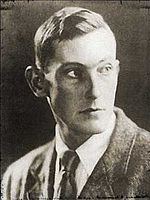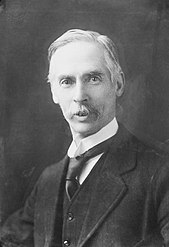
The University of Cambridge is composed of 31 colleges in addition to the academic departments and administration of the central University. Until the mid-19th century, both Cambridge and Oxford comprised a group of colleges with a small central university administration, rather than universities in the common sense. Cambridge's colleges are communities of students, academics and staff – an environment in which generations and academic disciplines are able to mix, with both students and fellows experiencing "the breadth and excellence of a top University at an intimate level".

The Open University (OU) is a British public research university and the largest university in the United Kingdom by number of students. The majority of the OU's undergraduate students are based in the United Kingdom and principally study off-campus; many of its courses can also be studied anywhere in the world. There are also a number of full-time postgraduate research students based on the 48-hectare university campus in Milton Keynes, where they use the OU facilities for research, as well as more than 1,000 members of academic and research staff and over 2,500 administrative, operational and support staff.
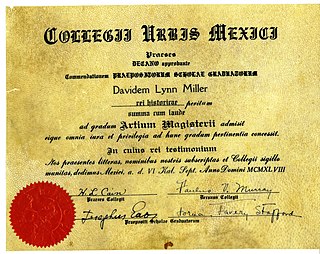
A diploma is a document awarded by an educational institution testifying the recipient has graduated by successfully completing their courses of studies. Historically, it has also referred to a charter or official document of diplomacy.
The system of academic degrees at the University of Oxford can be confusing to those not familiar with it. This is not merely because many degree titles date from the Middle Ages, but also because many changes have been haphazardly introduced in recent years. For example, the (medieval) BD, BM, BCL, etc. are postgraduate degrees, while the (modern) MPhys, MEng, etc. are undergraduate degrees.

The British undergraduate degree classification system is a grading structure for undergraduate degrees or bachelor's degrees and integrated master's degrees in the United Kingdom. The system has been applied in other countries and regions.
A Master of Laws is an advanced postgraduate academic degree, pursued by those either holding an undergraduate academic law degree, a professional law degree, or an undergraduate degree in a related subject. In most jurisdictions, the "Master of Laws" is the advanced professional degree for those usually already admitted into legal practice.
A graduate diploma is generally a qualification taken after completion of a first degree, although the level of study varies in different countries from being at the same level as the final year of a bachelor's degree to being at a level between a master's degree and a doctorate. In some countries the graduate diploma and postgraduate diploma are synonymous, while in others the postgraduate diploma is a higher qualification.
A postgraduate diploma is a postgraduate qualification awarded after a university degree, which supplements the original degree and awards them with a graduate diploma. Countries that award postgraduate diplomas include but are not limited to Bangladesh, Barbados, Belgium, Brazil, Canada, Chile, Colombia, Germany, Hong Kong, Jamaica, Spain, Kenya, South Africa, Sudan, India, Ireland, the Netherlands, New Zealand, Nigeria, Republic of Panama the Philippines, Portugal, Russia, Pakistan, Poland, Saudi Arabia, Singapore, Sweden, the United Kingdom, Sri Lanka, Trinidad and Tobago and Zimbabwe. Level of education and recognition differ per issuing country.
A Master of Engineering is either an academic or professional master's degree in the field of engineering.
The Cambridge Theological Federation (CTF) is an association of theological colleges, courses and houses based in Cambridge, England and founded in 1972. The federation offers several joint theological programmes of study open to students in member institutions; these programmes are either validated by or are taught on behalf either the University of Cambridge or Anglia Ruskin University. It also offers courses as part of the Common Award validated by Durham University.

The Faculty of Law, Cambridge is the law school of the University of Cambridge.
In the universities of Oxford, Cambridge, and Dublin, Bachelors of Arts are promoted to the degree of Master of Arts or Master in Arts (MA) on application after six or seven years' seniority as members of the university. It is an academic rank indicating seniority, and not an additional postgraduate qualification, and within the universities there are in fact no postgraduate degrees which result in the postnominals 'MA'. No further examination or study is required for this promotion and it is equivalent to undergraduate degrees awarded by other universities.

Cambridge Judge Business School is the business school of the University of Cambridge. The School is a provider of management education and is consistently ranked as one of the world's top business schools, with the Cambridge MBA programme ranked among the top 50 in the world by Bloomberg, the Financial Times, BusinessInsider, U.S. News & World Report and Forbes magazine. It is named after Sir Paul Judge, a founding benefactor of the school.
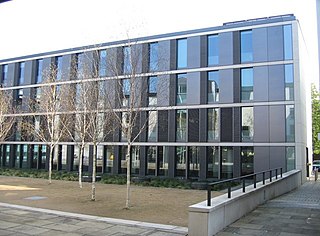
The Institute of Criminology is the criminological research institute within the Faculty of Law at the University of Cambridge. The institute is one of the oldest criminological research institutes in Europe, and has exerted a strong influence on the development of criminology. Its multidisciplinary teaching and research staff are recruited from the disciplines of law, psychiatry, psychology, and sociology. It is located on the Sidgwick Site in the west of Cambridge, England. The Institute of Criminology building was designed by Allies and Morrison. The institute is also home to the Radzinowicz Library, which houses the most comprehensive criminology collection in the United Kingdom. The institute has approximately 50 PhD students, 30-40 M.Phil. students, and 200 M.St students. The institute also offers courses to Cambridge undergraduates, particularly in law, but also in human social and political sciences and in psychology and behavioural sciences.
In the UK education sector, there are a wide range of qualification types offered by the United Kingdom awarding bodies. Qualifications range in size and type, can be academic, vocational or skills-related, and are grouped together into different levels of difficulty. In England, Wales and Northern Ireland, qualifications are divided into Higher Education qualifications, which are on the Framework for Higher Education Qualifications (FHEQ) and are awarded by bodies with degree awarding powers, and Regulated qualifications, which are on the Regulated Qualifications Framework (RQF) and are accredited by Ofqual in England, the Council for the Curriculum, Examinations and Assessment in Northern Ireland and Qualifications Wales in Wales. In Scotland, qualifications are divided into Higher Education qualifications, Scottish Qualifications Authority qualifications and Scottish Vocational Qualifications/Modern Apprenticeships, which are on the Scottish Credit and Qualifications Framework (SCQF). Scottish Higher Education Qualifications are on both the SCQF and the FHEQ.
A graduate certificate is an educational credential representing completion of specialized training at the college or university level. A graduate certificate can be awarded by universities upon completion of certain coursework indicating mastering of a specific subject area. Graduate certificates represent training at different levels in different countries and can be at bachelor's degree or master's degree level.

Faculty of Education, University of Cambridge is the School of Education located in Cambridge, UK and was established in 2001. It is part of the school of humanities and social sciences at the University of Cambridge.
The Cambridge Institute for Sustainability Leadership, formerly the Cambridge Programme for Sustainability Leadership and the Cambridge Programme for Industry, is part of the School of Technology within the University of Cambridge.

Marwadi University (MU) is a private university located in Rajkot, Gujarat, India. It was established on 9 May 2016 by the Marwadi Education Foundation through The Gujarat Private Universities (Amendment) Act, 2016. As of 2017, it offers 54 different courses. It is graded A+ by NAAC.
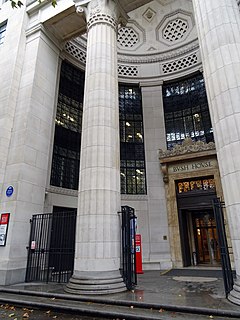
King's Business School (KBS) is the business school of King's College London located in London, the United Kingdom and is a constituent academic faculty of the university. King's College London was ranked 5th in the United Kingdom in The Complete University Guide (2023) and 12th in The Guardian's Business, Management & Marketing league table (2022).













